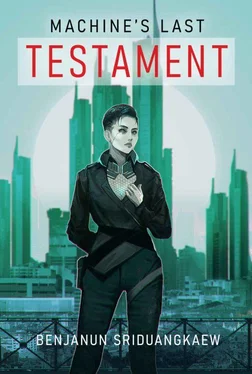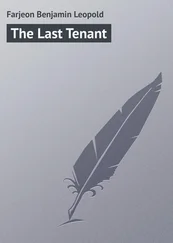What is a little more risk, a drop in the flood. She looks up who Dahaan’s caseworker was. Retired, out of the Bureau well before Dahaan’s arrest. Suzhen decides to take this as a good sign: not arrested as an accomplice, not dead. Nor available as a caseworker; the person now works as a language and etiquette teacher, offering lessons to potentiates.
Next she makes a transfer request. It is denied. Nattharat’s face appears, uninvited, on the internal channel. “Suzhen, dear, can you come see me at my office?” The tone is light. It is not a request.
Suzhen’s chest hurts as she makes the short distance. Just down the corridor: it occurs to her to disobey. In her ear, her guidance offers, “Citizen, you may delay the meeting if you wish, to take a relaxant. Your supervisor will be informed.”
“No.” Better to face this right away. She tries to assure herself that if her guidance will let her have time to herself this cannot be so urgent, it cannot be—yet—a criminal investigation.
Nattharat’s office is larger than hers, a humble but definite difference. Broad pine chairs, a table that looks as though it’s been hewn from a single block of granite, veined with pyrite. The furniture of someone who intends to stay, who intends to make a career in the Selection Bureau. Nearly everyone else has generic appliances, minimal decor. The supervisor gestures at one of the seats. “So good of you to come, Suzhen. I was lucky enough to receive Samsara the other day, were you about?”
“Unfortunately I wasn’t.” Suzhen tries to look deferential, demure, innocuous. Any quality that would exonerate her, a bulwark against prosecution. “I hope you enjoyed your blessing.”
“I did, I did. Samsara really makes you feel…” A blissful sigh. “Like they have such faith in you, unconditional faith.”
They, Suzhen thinks. The AI was not always a they, at least not that she can remember; once citizens referred to Samsara as an it. Or perhaps her recall betrays her and this is as it has ever been. She tries to think of a good memory, a moment of sublimity that would give her anchor. But all she can think of is the vineyard, the high trellises and their shadows, Ovuha’s thumb on her mouth.
Nattharat’s eyes glaze over. Looking at Ovuha’s case file, the progress reports that Suzhen made, the other ones that Suzhen’s guidance filed automatically. Whether she wanted it to or not. “Now.” Nattharat straightens, officious. “Is there something you’d like to tell me, dear?” Extending an opportunity.
“My potentiate—” A handful. Difficult and slovenly. To trivialize it, and protect Ovuha.
“Yes, well. Really so unfortunate, a tie to…” Nattharat shakes her head. “To that. Of all things. I realize you’ve gotten rather close to your potentiate, to help her integrate I’m sure, that is to your credit. And she has been behaving so well, endeared herself expertly. It must be a shock to your system.”
Suzhen stares at her supervisor. Her mouth is parched, even though here it is, salvation held out, a script offered. “My request to have her transferred was denied.” She says this tonelessly, stupidly.
“But of course.” Nattharat makes a gesture of discarding, flinging away detritus. “Your potentiate’s being detained. There’s still a chance she is innocent, for a definition of innocent; that’s the best-case scenario for you. If not though, you’ve done your best to extricate yourself as soon as you learned she wasn’t forthright with her background, haven’t you? We’ll do all we can to keep you out of it. Not to worry. I protect my own.”
Suzhen is barely aware of herself as she leaves Nattharat’s office, her limbs belonging to someone else, given motion by a foreign animus. It is not about her. Nattharat does not offer this aegis out of benevolence. Merely this says, Do you see, I was right about them, potentiates are what they are. Even the choice of accepting or refusing the script was just ceremonial. The decision has already been made for her. In the Bureau she both gives and receives lies, and in the end she has barely more control than Ovuha. Flotsam, after all.
In a time of crisis, choices narrow down to binaries: if-else branches. Commonality between human and early machine. Ovuha has often thought AIs were perfected in pursuit of wish fulfillment. The state that people aspire to is not apotheosis but total logic, rationality unclouded by nerve or panic, by the past or terror of the future.
When she was younger she thought of herself, with pride, as machine-like in that way. Steel inside and out, heuristics without flaw. Capable of carrying out her part, focused on the objective alone, untouched by feeling.
The door locked itself from the outside as soon as Suzhen was out, and she has not tried it or the window. This is not the time to exit in any case. Between now and her arrest will be the most guarded juncture. A window of opportunity will need to be found, or made, elsewhere. Now she waits.
Step by step she measures the apartment, the living room with its daytime butterflies. Humans fall into routine, coping mechanism and complacency both. Any suffering can be normalized and therefore borne, any comfort can be taken for granted and therefore lost; this is not a weakness to which she is immune. It has barely been any time and it feels otherwise, the familiarity of the sofa, the stovetop, the dining table. The betta, the butterflies, the—her eyes stop at the chair where Suzhen usually sits. Eating, thinking, studying Ovuha. This morning before she left, Suzhen had climbed up on a chair—Ovuha held it steady, though they did not talk—to renew the altar with a cup of tea and a spread of crystallized fruits. Irrationally this convinces Ovuha that Suzhen has had no part, was not the one to seal the door. She does wish she’d asked who the person on the altar was. A family resemblance.
She thinks of taking something Suzhen gifted her. But she will not be permitted anything, any belonging whatsoever, the frivolities that affirm personhood. Back in the system, whether into halfway house or prison, she’ll be scourged of who she is. In the end she applies a lipstick, lightly so the pigment barely shows, because it is an object Suzhen has touched and given her. The lipstick she leaves in the middle of the dining table, propped against a decorative hourglass. Then she sits, emptying her mind. It is useless to absorb the last of what she can, the fragrance of good toiletries, the view from the window. Those are not lasting, and will drown quickly enough.
They may let her keep the surname Suzhen selected for her. Less administrative busywork that way. So makeshift an appendage, Sui, yet in reduced circumstances she must treasure it.
The warden who comes for her is the one who saw her out of Penumbra, the older woman with the bland pudgy face and hair like a skullcap, harmless-looking. Two Interior Defense drones behind her, filling out the wide curved corridor with their fuliginous presence, their sleek shark lines and their lethal promise. Bipedal units with mouthless faces, at once in human image and not.
“Hello again, Warden Hinata,” she says. “I regret to impose myself on you once more.”
The woman looks at her without expression, mouth an unyielding line. “Do you never think of anyone else? Every potentiate’s misconduct makes it harder on the rest. Your own fellows and you haven’t spared a single thought. The crime might be yours, but the price will be theirs to pay.”
Does she believe that, Ovuha wonders, that potentiates are culpable; that policy corresponds logically and proportionately to their behavior. Most likely. It must be a comfortable groove to fall into, to wear down until it is as deep as a trench. Hinata believes that it is righteous for Samsara to destroy independent colonies; the warden has no reason to question it or question anything else.
Читать дальше












